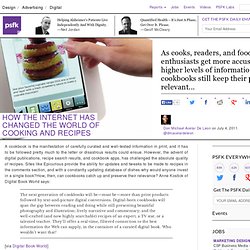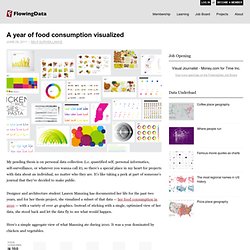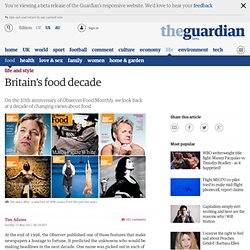

Rethink The Food Label. How The Internet Has Changed The World Of Cooking And Recipes. A cookbook is the manifestation of carefully curated and well-tested information in print, and it has to be followed pretty much to the letter or disastrous results could ensue.

However, the advent of digital publications, recipe search results, and cookbook apps, has challenged the absolute quality of recipes. Sites like Epicurious provide the ability for updates and tweaks to be made to recipes in the comments section, and with a constantly updating database of dishes why would anyone invest in a single book? How, then, can cookbooks catch up and preserve their relevance? Anne Kostick of Digital Book World says: The next generation of cookbooks will be—must be—more than print products followed by text-and-picture digital conversions. [via Digital Book World] A year of food consumption visualized. My pending thesis is on personal data collection (i.e. quantified self, personal informatics, self-surveillance, or whatever you wanna call it), so there's a special place in my heart for projects with data about an individual, no matter who they are.

It's like taking a peek at part of someone's journal that they've decided to make public. Designer and architecture student Lauren Manning has documented her life for the past two years, and for her thesis project, she visualized a subset of that data — her food consumption in 2010 — with a variety of over 40 graphics. Instead of sticking with a single, optimized view of her data, she stood back and let the data fly to see what would happen. Here's a simple aggregate view of what Manning ate during 2010. It was a year dominated by chicken and vegetables. This one uses concentric circles to show consumption over time. And finally, all the graphics were placed in a grid layout as shown below. [Data Visualization/Communication] How to Market Food and Beverage Through Mobile. Britain's food decade. At the end of 1998, the Observer published one of those features that make newspapers a hostage to fortune.

It predicted the unknowns who would be making headlines in the next decade. One name was picked out in each of 10 fields of the arts; looking back, the only second sight in evidence was the fact that the strike rate was predictably dismal (the band we should now apparently be listening to, for example, is a combo called Gay Dad...) Just one of the prophesies for household-name status came true, and this was in the newly designated art of chef-dom. One writer was dispatched to interview a young man who was at that time working on the grill at the River Cafe in Hammersmith, and described by the restaurant's co-owner, Rose Gray, as "a very talented boy, and an alluring sort of person". It would be a convo in which he described how fresh pasta "was a piece of piss" and borage "an old Roman herb I thought I'd try in a rav". For a long time this disconnect served the supermarkets well.